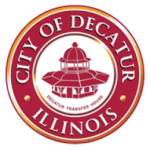On Monday, April 21, 2014, the City of Decatur established a stormwater utility. It is a way to fund the cost of municipal stormwater management services.
Like electricity, water and sanitary sewers, stormwater runoff can be managed as a utility. The utility will be supported by fees that every property owner within the City will be billed for on the City Utility Bill. The service charge will be based on the amount of runoff generated from each property. A way to quantify that runoff amount is to measure the amount of impervious surface on a property. Hard, impervious surfaces do not allow water to soak into the ground and, instead, stormwater runs off the property.
Rates
Beginning January 2024, every parcel in the City of Decatur will be charged based on the following:
- Residential Properties that are 1 acre or less will be charged a $4.00 base fee + $0.88 ERU fee per month ($4.88)
- Residential properties over 1 acre will be charged a $4.00 base fee + $0.88 x ERUs per month.
-
Base Fee $4.00 Usage Fee $0.88 x Number of ERUs Total Monthly Fee $4.00 + ($0.88 x ERUs)
-
- Non-residential properties will be charged a $4.00 base fee + $0.88 x ERUs per month.
-
Base Fee $4.00 Usage Fee $0.88 x Number of ERUs Total Monthly Fee $4.00 + ($0.88 x ERUs)
-
- Tax exempt properties will be charged like non-residential properties.
What’s an ERU? The Equivalent Residential Unit (ERU) is the average amount of impervious surface contained on residential properties. In Decatur, 1 ERU is 4,500 sf. So, for example, if a property has 45,000 sf of impervious surface, they would have 10 ERUs. (45,000 ÷ 4,500 = 10)
Beginning January 2025, every parcel in the City of Decatur will be charged based on the following:
- Residential Properties that are 1 acre or less will be charged a $5.00 base fee + $1.10 ERU fee per month ($6.10)
- Residential properties over 1 acre will be charged a $5.00 base fee + $1.10 x ERUs per month.
-
Base Fee $5.00 Usage Fee $1.10 x Number of ERUs Total Monthly Fee $5.00 + ($1.10 x ERUs)
-
- Non-residential properties will be charged a $5.00 base fee + $1.10 x ERUs per month.
-
Base Fee $5.00 Usage Fee $1.10 x Number of ERUs Total Monthly Fee $5.00 + ($1.10 x ERUs)
-
- Tax exempt properties will be charged like non-residential properties.
Beginning May 2026, each year the Base Fee and ERU shall be increased by 2.5 percent or by the annual percentage change of the U.S. Department of Labor Midwest Urban Consumer Price Index (CPI) for the preceding year, whichever is greater.
Credit Manual
As part of the Stormwater Utility, the City has developed a credit program through which a ratepayer can reduce their total stormwater utility fee. Credits will be available to all applicants who own developed properties within the City of Decatur corporate limits. The Stormwater Credit Manualopens PDF file provides the information, instructions and examples necessary to apply for a credit. Below are links to the application forms —
General-Credit-Application-Formopens PDF file
Combined Application Formopens PDF file
Best Management Practiceopens PDF file
Direct Dischargeopens PDF file
Educationopens PDF file
Frequent Storm Quantityopens PDF file
Individual Residentialopens PDF file
NPDES Complianceopens PDF file
Runoff Quantityopens PDF file
Zero Dischargeopens PDF file
Supplementary Material
Rain Garden Manual for Homeownersopens PDF file
Residential Stormwater Storage Fact Sheetopens PDF file
Pervious Pavement Fact Sheetopens PDF file
Storm Drainage Policyopens PDF file
IDOT Drainage Manualopens PDF file
More Information
Download the opens in a new windowStormwater Utility Brochureopens PDF file or read the Stormwater Utility Frequently Asked Questionsopens PDF file .
The Stormwater Utility Fee is not a tax. Fees are to be utilized to fund all or part of public works programs such as water, sewer, and stormwater. The amount you will be billed is based on how much square footage of your residential parcel is not lawns, gardens, flowerbeds, woods, or retention basins. Impervious surface equates to buildings/roofs, parking lots, driveways, gravel pads, and sidewalks. If you have additional questions or concerns regarding the stormwater utility fee you can call 217-424-2747 or e-mail: stormwater@decaturil.gov.

